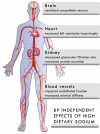Dietary sodium and health: more than just blood pressure
- PMID: 25766952
- PMCID: PMC5098396
- DOI: 10.1016/j.jacc.2014.12.039
Dietary sodium and health: more than just blood pressure
Abstract
Sodium is essential for cellular homeostasis and physiological function. Excess dietary sodium has been linked to elevations in blood pressure (BP). Salt sensitivity of BP varies widely, but certain subgroups tend to be more salt sensitive. The mechanisms underlying sodium-induced increases in BP are not completely understood but may involve alterations in renal function, fluid volume, fluid-regulatory hormones, the vasculature, cardiac function, and the autonomic nervous system. Recent pre-clinical and clinical data support that even in the absence of an increase in BP, excess dietary sodium can adversely affect target organs, including the blood vessels, heart, kidneys, and brain. In this review, the investigators review these issues and the epidemiological research relating dietary sodium to BP and cardiovascular health outcomes, addressing recent controversies. They also provide information and strategies for reducing dietary sodium.
Keywords: dietary sodium chloride; hypertension; kidney; sodium-restricted diet.
Copyright © 2015 American College of Cardiology Foundation. Published by Elsevier Inc. All rights reserved.
Figures


References
-
- Cannon WB. Organization for physiological homeostasis. Physiol Rev. 1929;9:399–431.
-
- Kawasaki T, Delea CS, Bartter FC, et al. The effect of high-sodium and low-sodium intakes on blood pressure and other related variables in human subjects with idiopathic hypertension. Am J Med. 1978;64:193–8. - PubMed
-
- Weinberger MH, Miller JZ, Luft FC, et al. Definitions and characteristics of sodium sensitivity and blood pressure resistance. Hypertension. 1986;8:II127–34. - PubMed
-
- Weinberger MH. Is salt-sensitivity of blood pressure a reproducible phenomenon-commentary. J Hypertens. 1996;14:1461–2. - PubMed
Publication types
MeSH terms
Substances
Grants and funding
LinkOut - more resources
Full Text Sources
Other Literature Sources
Medical

